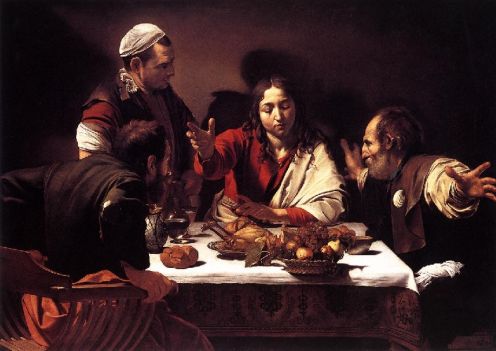Spiritual Sunday
I seem to be quoting T. S. Eliot’s The Waste Land a lot in this Lenten-Easter season (here and here), perhaps because I am attracted by the fact that, despite Eliot’s grim prognosis for the world, he finds a ray of Christian hope. Maybe his very pessimism makes that glimmer of light more credible. Today I quote the passage that alludes to the “Road to Emmaus” story, today’s lectionary reading.
The incident happens following the Resurrection when two of Jesus’ followers meet a stranger on the road, who explains to them the meaning of Christ’s death. Only later do they discover that the stranger is Jesus himself. Here’s the passage (Luke 34:13-35):
On the first day of the week, two of Jesus’ followers were going to a village called Emmaus, about seven miles from Jerusalem, and talking with each other about all these things that had happened. While they were talking and discussing, Jesus himself came near and went with them, but their eyes were kept from recognizing him. And he said to them, “What are you discussing with each other while you walk along?” They stood still, looking sad. Then one of them, whose name was Cleopas, answered him, “Are you the only stranger in Jerusalem who does not know the things that have taken place there in these days?” He asked them, “What things?” They replied, “The things about Jesus of Nazareth, who was a prophet mighty in deed and word before God and all the people, and how our chief priests and leaders handed him over to be condemned to death and crucified him. But we had hoped that he was the one to redeem Israel. Yes, and besides all this, it is now the third day since these things took place. Moreover, some women of our group astounded us. They were at the tomb early this morning, and when they did not find his body there, they came back and told us that they had indeed seen a vision of angels who said that he was alive. Some of those who were with us went to the tomb and found it just as the women had said; but they did not see him.” Then he said to them, “Oh, how foolish you are, and how slow of heart to believe all that the prophets have declared! Was it not necessary that the Messiah should suffer these things and then enter into his glory?” Then beginning with Moses and all the prophets, he interpreted to them the things about himself in all the scriptures. As they came near the village to which they were going, he walked ahead as if he were going on. But they urged him strongly, saying, “Stay with us, because it is almost evening and the day is now nearly over.” So he went in to stay with them. When he was at the table with them, he took bread, blessed and broke it, and gave it to them. Then their eyes were opened, and they recognized him; and he vanished from their sight. They said to each other, “Were not our hearts burning within us while he was talking to us on the road, while he was opening the scriptures to us?” That same hour they got up and returned to Jerusalem; and they found the eleven and their companions gathered together. They were saying, “The Lord has risen indeed, and he has appeared to Simon!” Then they told what had happened on the road, and how he had been made known to them in the breaking of the bread.
And now here is the passage from The Waste Land:
Who is the third who walks always beside you?
When I count, there are only you and I together
But when I look ahead up the white road
There is always another one walking beside you
Gliding wrapt in a brown mantle, hooded
I do not know whether a man or a woman
—But who is that on the other side of you?
By choosing to focus on the lack of recognition rather than on the later discovery, Eliot is pointing out the spiritual blindness of our age. “But who is that on the other side of you?” he asks, signaling ignorance. And yet we the readers may feel that the poet is a prophetic voice and that revelation is at hand. After all, in the stanzas that follow, there is a promise of rain, bringing the hope of life to the Waste Land.
Eliot offers no guarantees. Faith is required.


